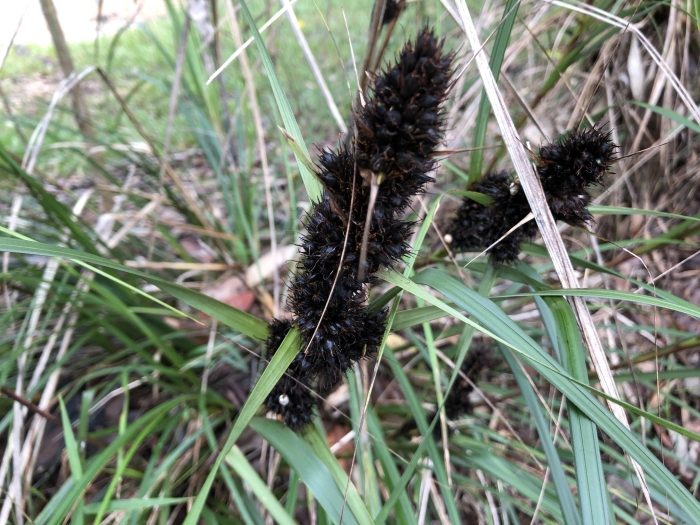Rough Saw-Sedge
(Gahnia aspera)
Rough Saw-Sedge (Gahnia aspera)
/
/

© elawrey
CC BY 4.0
Image By:
© elawrey
Recorded By:
Copyright:
CC BY 4.0
Copyright Notice:
Photo by: © elawrey | License Type: CC BY 4.0 | License URL: http://creativecommons.org/licenses/by/4.0/ | Uploader: elawrey | Publisher: iNaturalist |
























Estimated Native Range
Summary
Gahnia aspera, commonly known as rough saw-sedge or round sawsedge, is a tussock-forming perennial herb native to a variety of habitats including wet sclerophyll forests, coastal swamps, and heathlands in eastern Australia, as well as occurring in Malaysia, New Guinea, and Pacific islands. It typically grows to a height of 20-39 inches (50-100 cm) with a similar spread, featuring tough, strap-like leaves and producing inflorescences of small, creamy flowers in spring and summer. The flowers are not particularly showy but are followed by distinctive shiny red-brown nuts that add visual interest to the plant.
Rough saw-sedge is valued for its ability to thrive in a range of garden settings, particularly in moist soils and part shade to full sun conditions. It is often used for habitat restoration, erosion control, and as a garden ornamental, providing shelter and food for small birds and insects. While it prefers moist, well-drained soils, it can tolerate periods of dryness once established. It is generally low-maintenance but can be trimmed back if it becomes too untidy. In cultivation outside its native range, care should be taken as it has the potential to become invasive.CC BY-SA 4.0
Rough saw-sedge is valued for its ability to thrive in a range of garden settings, particularly in moist soils and part shade to full sun conditions. It is often used for habitat restoration, erosion control, and as a garden ornamental, providing shelter and food for small birds and insects. While it prefers moist, well-drained soils, it can tolerate periods of dryness once established. It is generally low-maintenance but can be trimmed back if it becomes too untidy. In cultivation outside its native range, care should be taken as it has the potential to become invasive.CC BY-SA 4.0
Plant Description
- Plant Type: Grass
- Height: 1.75-3.25 feet
- Width: 1.75-5 feet
- Growth Rate: Moderate
- Flower Color: N/A
- Flowering Season: Spring, Summer, Fall, Winter
- Leaf Retention: Evergreen
Growth Requirements
- Sun: Full Sun, Part Shade
- Water: Medium, High
- Drainage: Medium, Slow
Common Uses
Bird Garden, Erosion Control, Low Maintenance, Water Garden
Natural Habitat
Wet sclerophyll forests, coastal swamps, and heathlands
Other Names
Common Names: Saw Sedge, Cutting Grass, Rough Saw-sedge
Scientific Names: , Gahnia aspera, Cladium asperum, Lampocarya aspera, Mariscus asper, Mariscus aspera,
GBIF Accepted Name: